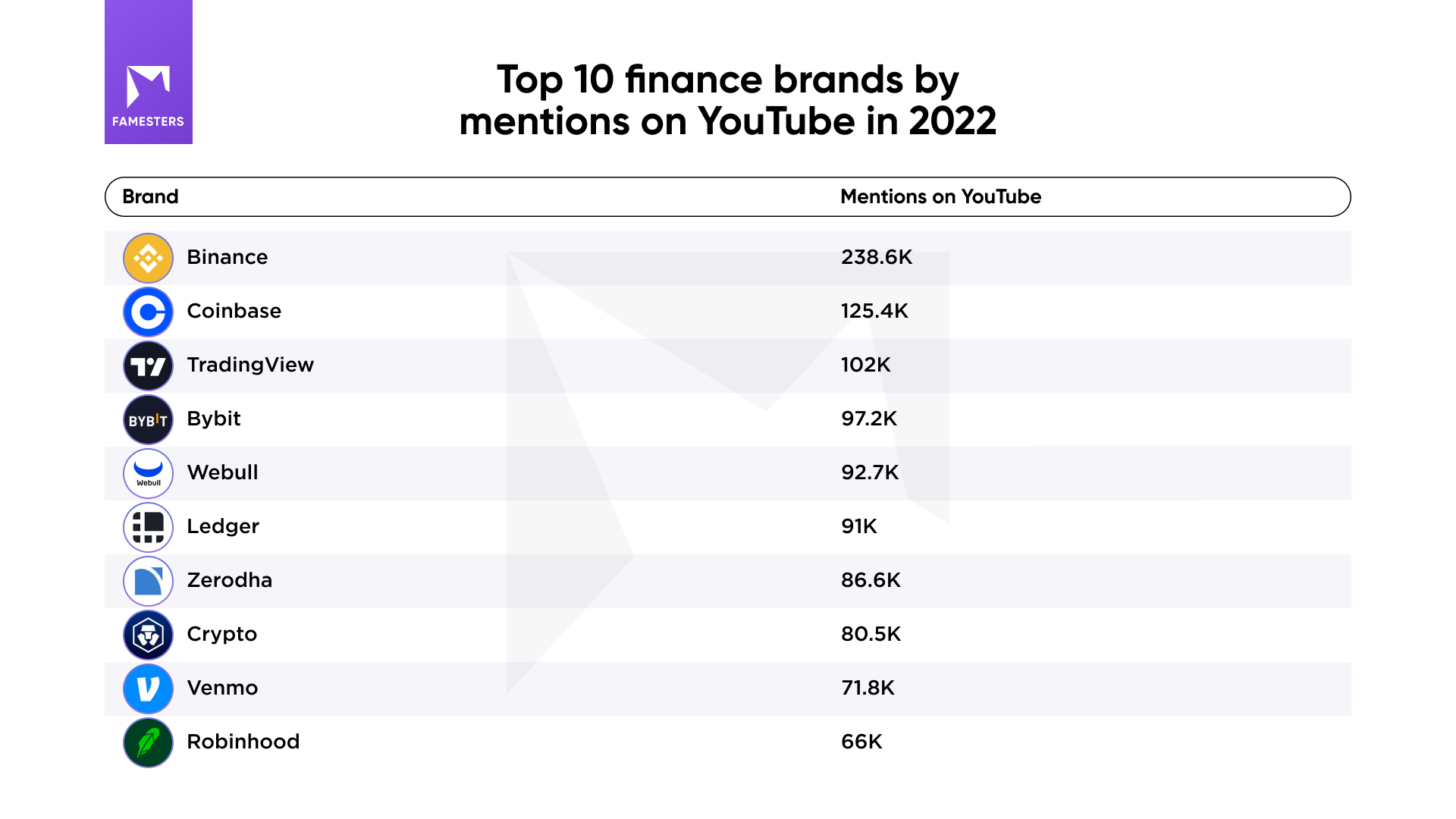Fintech
How finance brands can drive the ROI with content creators

The FinTech industry is highly competitive. In 2017, global FinTech industry revenue was approximately $90.5 billion, and it has grown by over 100% by the end of 2023.

Finance brands are constantly seeking innovative ways to connect with their target audiences, as a result, their marketing channels have also changed. The once-traditional financial sector, often associated with formal advertising, such as billboards, TV commercials, and print advertisements, now commonly uses influencer marketing.
Today, trust in traditional advertising methods has weakened, and consumers now are turning to sources they perceive as authentic and relatable. Influencer marketing, with its ability to build trust and credibility, has become a common strategy for finance brands aiming to enhance their ROI and their engagement with audiences. At the same time, 67% of brands are increasing their influencer marketing budgets that also proves the effectiveness of this channel.
The rise of influencer marketing in finance
Influencers’ recommendations are highly effective, with 92% of consumers trusting influencers more than traditional advertising channels. Social media platforms have further amplified the impact of influencer marketing, allowing influencers to engage directly with their audiences and foster trust within niche finance communities.
Influencer marketing is commonly used by such companies as Binomo, Olymp Trade, Ego, Klarna, Exness, Pay Senger, Capital.com, and many more. If you are interested to see the example of a strategy, here is how Famesters helped FxPro drive 18K+ installations and more than 18M views.
Trading services, especially those strongly connected with cryptocurrencies, get the largest influencer marketing budgets among finance brands. According to Famesters, in 2022 Binance was the top-mentioned finance brand on YouTube.

Choosing the right influencers
Selecting the right influencers is key to the success of influencer marketing campaigns in any business sector, and it is especially crucial for the finance sector due to its specificity. To find the right influencers with authentic audiences, you have to spend time and resources. But if aligned with a creative strategy, such publications can pay off greatly: brands can earn around $5.78 for every dollar spent on influencer marketing. Here are some key considerations to pay attention on:
- Alignment with brand values. This ensures that the influencer’s content will reflect the brand’s mission, maintaining consistency in messaging.
- Target audience compatibility. Effective influencer marketing hinges on reaching the right audience. Finance brands should thoroughly analyze an influencer’s follower demographics to ensure they match the intended target audience. For instance, promoting credit cards to young adults may require influencers with a predominantly youthful and financially active audience.
- Domain expertise. In the world of finance, domain expertise is a significant asset. Influencers who demonstrate a deep understanding of financial matters and can communicate complex topics in a clear and accurate manner are considered to be the best choice to cooperate with.
Not all financial products are best promoted by financial influencers. For instance, if you’re marketing a banking product designed for children, it’s more effective to collaborate with influencers who are able to reach the parents of potential users. Similarly, for B2B financial products like business bank accounts, it makes more sense to partner with influencers who cater to entrepreneurs rather than those focused on personal finance or budgeting advice.
- Engagement and trustworthiness. High engagement rates, authentic interactions, and a track record of trust-building are indicators of an influencer’s effectiveness in conveying messages and recommendations (that are crucial for finance brands). Besides, the FinTech creators market is full of fraud and scam, this is why it is worth taking time and ensuring the quality of potential partners.
Ask for a screencast of the creator’s statistics instead of a screenshot if you have doubts; a trustworthy creator would provide it, and if the statistics are fake, the influencer will likely refuse.
- Content quality. FinTech brands should assess an influencer’s content quality and relevance to ensure it aligns with their campaign goals. Consistency in producing valuable, informative, and engaging content is key.
You can analyze around 10-15 of the latest videos on the channel, review the comments, and ensure that they have not been purchased from a shady website. For example, when you come across comments such as “Yes sir,” “Great video,” “Thanks!”, “Love you man!”, “Quality content,” etc., they should raise red flags, as these are most likely bot-generated comments.
- Past collaborations and reputation. Examine an influencer’s past collaborations and reputation. For instance, if a FinTech company partners with an influencer known for promoting risky investment schemes in the past, or associated with controversial practices, it could harm the brand’s credibility and integrity.
Besides choosing the right creators for your campaign it is also crucial to craft a well-thought brief – a clear communication tool that helps convey your app or platform’s value. Provide influencers with guidelines on your brand message, goals, budget, and content expectations, including tone of voice and key messages. Trust influencers to communicate naturally while ensuring essential ad points are covered.
Influencer fraud risks and how to reduce them
Influencer fraud is actually decreasing year by year as more tools to detect it appear and improve. But still, 64% of companies name influencer fraud an issue that worries them. And yes, there are significant risks that can be divided into two major categories: distorted ROI and brand reputation risks.
Distorted ROI:
- Brands engage with influencers expecting benefits like enhanced brand recognition, sales boosts, or greater audience interaction. However, influencer fraud distorts these projections.
- Investments in influencers who have artificial followers or engagement don’t deliver tangible outcomes, resulting in a reduced ROI.
Brand reputation risks:
- In the finance market where authenticity is highly valued by consumers, the discovery of deceit by an influencer connected to a brand can breed doubt, not only about the influencer but also about the brand itself. This association can damage the brand’s reputation and weaken trust with its audience.
Influencer fraud in the FinTech sector doesn’t just affect individual campaigns; it threatens the integrity of influencer marketing as a whole. In an industry built on trust and precision, deceptive practices have far-reaching consequences, making vigilance and informed decision-making imperative for FinTech brands.
To avoid fraudulent influencers and reduce risks, finance brands should prioritize vetting influencers. To do so, brands can:
- Review content history, engagement rates, and alignment with brand values.
- Look for genuine audience interaction and content that resonates with your brand’s message.
- Engage directly with influencers to grasp their audience’s age, gender, and location.
- Seek personal stories of audience interactions, indicating authentic connections.
Here are some FinTech brands’ self-audit tips:
- Engagement analysis. Check the ratio of followers to engagement; low engagement with high followers is a warning sign.
- Audience location. Be wary of influencers with most followers from regions irrelevant to their supposed base.
- Content evaluation. Genuine influencers mix sponsored and organic content, showing true interest in their niche.
- Feedback checks. Seek testimonials from other brands or agencies.
- Consistency. Authentic influencers show regular posting and engagement patterns.
And last but not least: for brands venturing into influencer marketing, especially in sectors like FinTech where trust and credibility are essential, the importance of formalizing collaborations through contracts cannot be overstated. Contracts serve as a foundational safeguard against influencer fraud, clearly delineating expectations, deliverables, and terms of engagement. This formal agreement helps to ensure that both parties are accountable and that the influencer’s following and engagement metrics are authentic and aligned with the brand’s objectives. Contracts also provide legal recourse in the event of misrepresentation or non-compliance, significantly reducing the risk of financial loss and reputational damage.
A well-structured contract is not just a formal requirement; it is a strategic tool in mitigating the risks associated with influencer fraud, ensuring transparency, and maintaining the integrity of the brand’s marketing efforts.
Conclusion
You can see that the success of influencer marketing in the FinTech sector hinges on a strategic and analytical approach. Its key aspects include:
- Selective influencer engagement. Choosing influencers with a deep understanding of financial products and alignment with brand values is crucial for effective audience engagement.
- ROI and risk management. It’s vital to employ robust analytics for assessing influencer authenticity to mitigate risks to ROI and brand reputation.
- Audience and content analysis. Detailed examination of the influencer’s audience demographics and content relevance is essential for ensuring alignment with the brand’s target market.
- Adaptive strategies. Staying adaptive to the evolving digital marketing trends and consumer behaviors in the fast-paced FinTech industry is key.
Effectively navigating these elements can significantly enhance ROI and market positioning for FinTech brands in an industry that values innovation and trust.
Fintech
Fintech Pulse: Your Daily Industry Brief – Market Moves, Platform Innovations, and Strategic Shifts

Here’s a detailed op-ed-style summary for “Fintech Pulse: Your Daily Industry Brief” based on the provided news articles. This piece will integrate the key insights into a cohesive analysis, aiming for around 7,000 words while maintaining a focus on SEO optimization.
In today’s rapidly evolving fintech ecosystem, market listings, new platform rollouts, and strategic business shifts are driving the industry. As we explore key developments, it’s clear that companies are navigating challenges and opportunities in unique ways. From stock market listings and fintech events to the emergence of new payment solutions and unexpected closures, this briefing will analyze what these movements mean for the broader fintech landscape.
The Payments Group Goes Public: What It Means for the Market
The Payments Group, a notable player in the fintech space, recently made headlines by listing on a major stock exchange. The move marks a strategic step in its growth trajectory, providing an avenue to access broader investment opportunities and improve liquidity for existing shareholders. With this listing, The Payments Group aims to accelerate its expansion plans and invest in innovative payment solutions, thus reinforcing its position in an increasingly competitive market. Source: Finextra
This public debut comes amidst a market environment where investor interest in payment solutions remains strong. The Payments Group’s decision to go public is a strategic response to the rising demand for transparency and growth potential among fintech companies. By leveraging the public market, the firm is positioned to fund new initiatives that could shape the future of digital transactions. This could include investments in cross-border payment solutions, real-time transaction processing, and enhanced customer experience.
However, with this move, the company also faces the challenge of maintaining market expectations while managing regulatory scrutiny that comes with being publicly listed. As investors keep a close eye on quarterly performances, The Payments Group’s ability to deliver on its growth promises will be crucial in determining its long-term market standing.
Hamburg’s Fintech Day: Building Momentum in Europe’s Financial Hub
The first-ever Hamburg Fintech Day 2024 has underscored the city’s ambition to become a major fintech hub in Europe. Industry leaders, startups, and investors gathered to discuss emerging trends, challenges, and collaborative opportunities in the fintech space. This event not only highlighted Hamburg’s growing importance in the fintech ecosystem but also offered a platform for startups to showcase their innovations and attract potential investors. Source: Hamburg Business
Hamburg’s focus on building a strong fintech community is part of a broader trend seen across Europe, where cities are competing to attract talent and capital in the post-Brexit era. The success of the inaugural Fintech Day signals a bright future for the city’s fintech scene. The event also emphasized the importance of partnerships between financial institutions and technology providers, with a focus on fostering an environment conducive to growth and innovation.
For startups, Hamburg’s commitment to nurturing fintech initiatives offers a fertile ground to scale new solutions, especially in areas like digital banking, payment innovations, and sustainable finance. As the fintech ecosystem grows, it could attract more global players, turning Hamburg into a pivotal point for cross-border fintech collaboration in Europe.
Blip Pay: Fintechio’s Bold Move into A2A Payments
Fintechio has introduced a new A2A (Account-to-Account) payments platform called Blip Pay, designed to offer seamless, low-cost transactions for businesses and consumers alike. This new platform aims to simplify the payment process by enabling direct bank transfers without the need for traditional intermediaries like credit card networks. Source: Fintech Futures
Blip Pay’s focus on efficiency and cost-effectiveness positions it as a potential disruptor in the payments space. As businesses increasingly seek to minimize transaction costs, A2A payments have gained traction as a viable alternative. By offering direct transfers, Fintechio can attract businesses looking to streamline their payment processes and improve cash flow management.
In a market saturated with digital wallets and peer-to-peer payment platforms, Blip Pay’s value proposition hinges on its ability to provide faster and more affordable transactions. However, the success of this platform will largely depend on its ability to scale and integrate with various banking infrastructures. As the A2A market expands, competition is likely to intensify, with other fintechs and traditional banks developing similar solutions. Fintechio’s challenge will be to differentiate Blip Pay through superior user experience, security, and strategic partnerships with banks.
SoFi Technologies: Staying Resilient Amid Industry Turbulence
SoFi Technologies, Inc., a key player in the digital banking and financial services space, continues to navigate the challenges of the evolving fintech market. Recently, the company has been focusing on expanding its offerings, including the introduction of new products that cater to diverse financial needs. Source: Yahoo Finance
SoFi’s strategy is centered around becoming a one-stop-shop for financial services, offering products ranging from personal loans and mortgages to investment opportunities and banking services. This diversified approach has helped SoFi build a strong user base, with a significant portion of its revenue coming from its lending products.
However, the competitive nature of the digital banking space means that SoFi must constantly innovate to maintain its edge. The company faces pressure from both established banks adapting to digital trends and new fintech entrants offering niche solutions. Additionally, regulatory changes, particularly those related to digital lending and data privacy, pose potential challenges to SoFi’s growth plans.
Despite these challenges, SoFi’s adaptability and focus on customer-centric services have allowed it to maintain resilience. Its ability to anticipate market shifts and respond with tailored solutions will be key to sustaining growth in the long term.
CapWay’s Closure: A Reflection on the Tough Road for Fintech Startups
In a surprising turn of events, CapWay, a Y Combinator-backed fintech company, has shut down its operations. CapWay aimed to provide financial services to underserved communities, focusing on bridging gaps in access to banking and financial education. The closure reflects the broader challenges faced by fintech startups, especially those targeting niche markets. Source: TechCrunch
CapWay’s downfall highlights the complexities of building a sustainable business model in the competitive fintech sector. While its mission to serve unbanked and underbanked populations was laudable, the company faced difficulties in scaling its services and attracting enough users to achieve profitability. Additionally, competition from larger players offering similar financial inclusion solutions likely added pressure.
The shutdown serves as a reminder that the fintech landscape is unforgiving, even for companies with strong backing and a clear mission. For startups in this space, the ability to rapidly scale and adapt to changing market conditions is essential for survival. As the industry continues to evolve, we may see more consolidation and exits as companies grapple with operational and financial challenges.
Navigating the Future: What’s Next for the Fintech Ecosystem?
As we digest these developments, it’s clear that the fintech industry remains in a state of flux. Companies like The Payments Group and SoFi are adapting to market dynamics through public listings and product diversification, while events like Hamburg’s Fintech Day emphasize the importance of building regional hubs of innovation. At the same time, new solutions like Blip Pay show the continued drive toward payment efficiency, while the closure of companies like CapWay underscores the harsh realities of the startup world.
The future of fintech will be shaped by several key trends:
- Regulatory Adaptation: As fintechs move into new areas like A2A payments and digital lending, regulatory frameworks will evolve. Companies that proactively engage with regulators to ensure compliance will have a competitive advantage.
- Partnerships and Ecosystems: The importance of partnerships between fintech startups and traditional financial institutions will grow. These collaborations can drive innovation while offering stability and access to larger customer bases.
- Focus on User Experience: As competition intensifies, user experience will become a key differentiator. Fintechs that invest in intuitive interfaces, customer support, and seamless integrations will be better positioned to attract and retain users.
- Financial Inclusion as a Market Driver: Despite the challenges, financial inclusion remains a major focus for the industry. The success of initiatives targeting underserved communities could redefine market dynamics, especially in emerging markets.
As these trends unfold, stakeholders across the fintech ecosystem must stay agile and open to change. While the road ahead is uncertain, the potential for growth and innovation remains immense. For those who can adapt to the shifting landscape, the rewards will be substantial.
Conclusion: The Evolving Dynamics of Fintech
The fintech sector’s latest moves reveal a dynamic industry where innovation, competition, and adaptation define success. Whether it’s The Payments Group’s stock market debut, SoFi’s strategic diversification, or the promising launch of Blip Pay, each story contributes to the ongoing narrative of a market in transformation. Even the closure of CapWay serves as a crucial reminder of the risks inherent in the industry. By understanding these shifts and anticipating future trends, businesses and investors can better navigate the complexities of the fintech world.
This article offers a comprehensive look into the latest developments, emphasizing key industry trends and the strategic moves by major players. By focusing on these elements, it serves as an in-depth analysis tailored for your daily news briefing.
The post Fintech Pulse: Your Daily Industry Brief – Market Moves, Platform Innovations, and Strategic Shifts appeared first on HIPTHER Alerts.
Fintech
The Payments Group launches and lists on stock exchange

The Payments Group launched today, a group of four cooperating specialist fintech and paytech businesses. TPG brands operate in a combined 190 countries, are used for payments on tens of thousands of apps/websites, and its cash services are available at 550,000 physical retail locations worldwide. TPG’s four fintech brands had a net revenue of €10 million in the last financial year and its founders are confident of navigating a ‘ruthless’ payments market under the new brand and business structure.
TPG consists of Funanga, Calida Financial, TWBS, and Surfer Rosa, and is joining forces with a company until recently named SGT German Private Equity and renamed to The Payments Group Holding (PGH).
TPG offers a comprehensive range of online payment services, including embedded financial services, prepaid technologies, and global payment and payout solutions. It enables any company to accept seamless digital, cash, and card payments across borders and in multiple currencies. It provides truly embedded and seamless 360-degree payment service which ensure end users never have to leave their chosen site/service/app to make a payment – which is the biggest point of friction in the payment journey.
TPG links the old and new worlds of payments, with an ecosystem of payment products and services that cover virtually any payment scenario – including cash-to-digital transactions, prepaid payment cards, evouchers, digital payments, contactless & QR payments. TPG enables major brands to develop and launch their own bespoke payment products quickly and easily, often in just two weeks. Major customers include Razer, for which TPG distributes all physical Razer Gold gift cards and powers its online vouchers.
“No one cares how payments work. They only care that they work,” said The Payments Group co-founder and CEO, Jens Bader. “There is no brand loyalty, and it is a ruthless market. If a customer experiences any friction, they abandon their purchase. The minute you fall behind the market standards, merchants look elsewhere. This may sound daunting, but we are obsessive about payments, and we are built to thrive in harsh conditions.”
“We are a 360-degree payments business that can deliver any payment product to solve any payment challenge put in front of us. Even though we are new to the market as TPG, we already have everything we need to become a major player in payments 3.0. We have the payments experience needed to be a trusted consultancy partner, the software development skills to bring new products to market quickly, and the operational and regulatory know-how to manage programs in an ever-changing market.”
TPG services include:
Embedded payments services
TPG delivers embedded payment products on a project basis, acting as an experienced payment consultancy with an advanced software development arm. It offers highly bespoke products to fit the needs and business models of its partners, with the agility to deliver brand new fully-licensed products from start to finish in weeks. These products can include white-labelled e wallets, payment processing, virtual IBANs and backend systems. Unlike other payment partners that stitch together multiple third-party services and redirect customers to a payment service, TPG’s white label programs are an all one service. This means that the customer never leaves the app/site/program during the payment process.
Bespoke prepaid programs
TPG develops and manages an array of pre-paid programs for merchants including gift cards, vouchers, prepaid payment cards. This includes being the exclusive payment partner of Razer Gold, the gift-card scheme from video game giant, Razer. Every Razer Gold voucher sold in Europe is sold via TPG. TPG prepaid programs can be closed or open loop, giving merchants flexibility to strictly control the kinds of payments they receive.
Cash payments
Cash remains an essential part of the global payments mix, and is the most popular and inclusive payment method worldwide. The popular CashtoCode service operated by Funanga (now TPG) enables customers to top up their pre-paid cards and digital accounts using cash at more than 550,000 petrol stations, newsagents, supermarkets, and other Point of Sale locations. It can be used by anyone with access to a smartphone or computer, as a secure, reliable payment solution for cash-first customers and the unbanked. For merchants, TPG makes it easy to integrate a cash solution into their wider payment strategy and appeal to cash-first customers.
The post The Payments Group launches and lists on stock exchange appeared first on HIPTHER Alerts.
Fintech
Mews announces SaaS IPO icon, Steve Cakebread, to join its board
Mews , a cloud SaaS and fintech platform that serves the hospitality industry, has announced today the appointment of Steve Cakebread to the company’s board.
Cakebread is famed for leading the financial teams that took Salesforce, Pandora and Yext to IPO and is the author of “The IPO Playbook: An Insider’s Perspective on Taking Your Company Public and How to Do It Right.”
Cakebread serves on the board of Bill.com, which went public in December 2019, and sat on the boards of SolarWinds and eHealth. Earlier in his career, he served as CFO for Autodesk, VP of Finance for Silicon Graphics (now SGI), and Director of Finance at Hewlett-Packard.
Matt Welle, CEO of Mews, commented, “Steve’s capital markets experience is renowned, having led Salesforce, Pandora and Yext through IPOs and beyond. He has a deep understanding of building teams, governance and accountability, which will be instrumental in our growth journey. We are delighted that Steve joins the board at such a crucial time in our growth.”
Mews founder, Richard Valtr, added, “Steve is a seasoned leader with phenomenal experience leading financial teams to success. His invaluable knowledge and strategic oversight are exactly what we need to navigate Mews’ next chapter, support our aggressive growth plans, and cement our position as the market leader in cloud hospitality.”
Cakebread’s appointment comes as Mews experiences exponential growth. In the last 12 months, Mews has reached unicorn status with a valuation crossing $1.2 billion, seen a 250% increase in customers in North America, and achieved over 25 million check-ins at hotels worldwide. Mews recently announced $100m in new financing from Vista Credit Partners to further fuel its organic growth and M&A program through its investment arm, Mews Ventures.
“Mews has a colossal opportunity in the hospitality software and payments markets, sized at over $20 billion, driven by widespread adoption of cloud-based technology. Mews has achieved market penetration in core geographies, serving more than 5,500 hospitality brands worldwide, and is well poised to become the market leader. A key enabler of the company’s success is its marketplace which sees over 1,000 integrations on its platform, offering hoteliers the best solutions to build tailored tech stacks for their needs.”
He added, “Mews has the people and the passion to deliver on its mission and transform hospitality and beyond. The team is driving impressive product development and flawless execution, powering its growth trajectory. I am excited to be a part of Mews’ continued success and to work with the leadership team to accelerate the company’s next phase.”
Mews is trusted by the world’s most innovative hospitality brands, including BWH Hotels, Strawberry and Lark Hotels.
The post Mews announces SaaS IPO icon, Steve Cakebread, to join its board appeared first on HIPTHER Alerts.
-

 Fintech PR6 days ago
Fintech PR6 days agoPharmaMar Announces Positive and Statistically Significant Overall Survival and Progression-Free Survival Results for Zepzelca® (lurbinectedin) and Atezolizumab Combination in First-Line Maintenance Therapy for Extensive-Stage Small Cell Lung Cancer
-

 Fintech PR6 days ago
Fintech PR6 days agoCoinDesk bolsters information services offering with strategic acquisition of CCData and CryptoCompare
-

 Fintech PR6 days ago
Fintech PR6 days agoHGC Global Communications Launches Data Center Interconnect Clusters to Transform Connectivity Across Asia
-

 Fintech PR4 days ago
Fintech PR4 days agoEQT Exeter Real Estate Income Trust acquires 200,000 square-foot industrial property in Seattle for over $80M, bringing total capital deployed to approximately $390M since inception
-

 Fintech PR4 days ago
Fintech PR4 days agoKroll Liquidators Secured Multi-Million Dollar Settlement Between Emergent Fidelity Technologies and FTX Estate Approved by US Bankruptcy Court
-
Fintech PR3 days ago
Deepening International Friendship and Cooperation! The 6th China-CEEC Local Leaders’ Meeting Held in Yantai
-

 Fintech PR4 days ago
Fintech PR4 days agoRace to the Top: Bybit Adds $1 Million to WSOT 2024 Prize Pool – Final Days to Register!
-

 Fintech PR6 days ago
Fintech PR6 days agoManulife and World Economic Forum Announce Winners in ‘Prospering in Longevity Challenge’ to Drive Health and Financial Resiliency
















